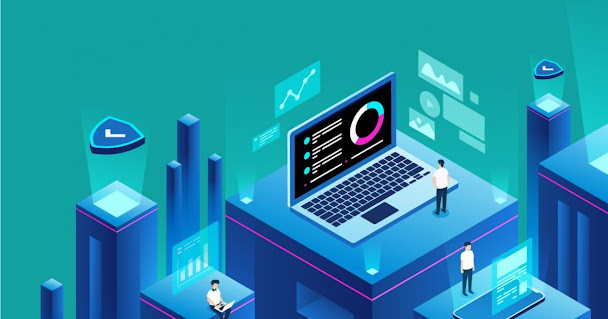''' '' THE -PROPRIETARY
SOFTWARE- TAP '' '''
IN 2015 - AMID RISING CONCERNS THAT AUTOMATION would kill jobs, Mr. Bessen published a paper that examined the impact of computer automation on 317 occupations from 1980 through 2013.
His summary conclusion : ''Employment grows significantly faster in occupations that use computers more.''
BLENDING DATA ANALYSIS WITH NARRATIVE case studies is the hallmark of Mr. James Bessen's research. He is a business historian and a fluid writer. His book contains accounts of the evolving use of software in many industries, including autos, banking,retailing, insurance, garbage hauling, logistics and trucking .
Mr.Bessen's observations about increasing market concentration, rising inequality, and slowing innovation and productivity echo those of other researchers. Most of those studies, though, are high-level economic research.
His focus is a more detailed look within industries and at individual companies, seeking the underlying technology engine behind the broad economic trends.
''He has a new, complementary perspective on what we're seeing,'' said Chiara Crisculo, an economist at the Organization for Economic Cooperation and Development. ''It gives you much more of the mechanism for why we got to where we got.''
That mechanism is what Mr.Bessen calls ''proprietary software.'' He defines it broadly as not only code but also the data that companies collect on their customers and operations, the skills of their workers and the organizational changes they have made to exploit the technology.
His measure of proprietary software does not include spending on standard business software from companies like Oracle, SAP and Salesforce. Instead, it is the investment that companies make in custom software from those suppliers and others, and in their own in-house applications.
Some of the software may be freely available open-source code, he notes, but the overall system is closed.
Mr. Bessen's analysis is based on government and industry data, supplemented by information on jobs and salary estimates from Lightcast, a labor market research firm.
The total investment in proprietary software grew 74 percent to $239 billion over the decade that ended in 2019, the most recent year for which government statistics are available. The big companies use this technology to manage complexity and gain competitive advantage, according to Mr.Bessen.
The big banks use their software and customer data to customize credit cards and offerings to individuals in a way that smaller rivals cannot. Walmart and Amazon use their proprietary software to streamline logistics and personalize marketing, Google and Facebook use it to tailor ads to consumers.
Insurers use it to customize and market health plans to individuals.Pharmacy benefit management companies use it to navigate the complexity of drug reimbursement plans. And the list goes on.
Evidence of the proprietary software advantage is abundant and convincing, in Mr. Bensen's view.
The software-enabled winners in the industries are more productive than their smaller rivals and they pay more - 17 percent more on average for the same jobs, Mr. Bessin estimates.
But their success, he argues, has come at too great a price. Competition has suffered. Since the late 1990s, the chances of unseating a dominant firm - typically, one of the top four by sales in an industry -have declined by half.
And technology, he contends, is spreading and being adapted across industries more slowly than in the past, which exacerbates the trends of inequality and market concentration.
His policy answer is not to break up dominant companies, but to nudge or force them to open up. For example, IBM, under antitrust pressure, unbundled its software from its hardware business in 1969. That move, Mr. Bessen writes, led to a flourishing software industry.
Today's proprietary platforms, he asserts, could be opened through access to their software platforms or to customer data they have harvested - a prescription that policymakers in Europe and America are considering.
Mr. Bessen points to a seemingly unlikely protagonist : Amazon. Opening its computing infrastructure, he said, created the cloud computing industry. ''In some ways,'' he said, ''Amazon is a model of what I'd like to see other firms do,'' though with appropriate oversight.
One critique of Mr. Bessen's analysis is that he is observing a wave of technology adoption that still has a long way to run, and that his concerns are overstated.
''These superstar firms are very productive,'' said Robert Atkinson, president of the Information Technology and Innovation Foundation, a policy research group. ''The question is why aren't other companies as productive as yet?'' He added they were likely to catch up.
''Technology,'' Mr. Bessen said, ''is playing a different role than it has in the past - less to disrupt than entrench.''
The Honour and Serving of the Latest Global Operational Research on Software and Realms, continues. The World Students Society thanks author Steve Lohr.
With most respectful dedication to the Global Founder Framers of The World Students Society, and then Students, Professors and Teachers of the world.
See Ya all on !WOW! : the open source exclusive platform of every student in the world to prepare and register for Great Global Elections that will help accelerate creative honours : wssciw.blogspot.com and Twitter - !E-WOW! - The Ecosystem 2011 :
Good Night and God Bless
SAM Daily Times - the Voice of the Voiceless

.png)


0 comments:
Post a Comment
Grace A Comment!